OldSpeak
Whose Side Are You On? Oliver North's 1994 Run for the Senate
By Jayson Whitehead
August 10, 2004
In the opening scene of the 1996 documentary A Perfect Candidate, Marine Lt. Col. Oliver L. North is shown in the summer of 1986 as he sits before a Senate special committee investigating illegal activity by officials in the Reagan Administration. As the U.S. Counter-Terrorism Coordinator from 1983-1986, North was accused of being a main figure in the covert sale of arms to Iran in exchange for American hostages. The profit from the sales was then illegally diverted to anti-communist Contras in Nicaragua. A portion was diverted to a Swiss Bank account and used for a home security system for North’s Virginia residence. North was also accused of helping to destroy evidence. With TV cameras focused on him, North confessed that he had misled the committee.
"We do live in a democracy, don’t we?" a congressman asked the Marine.
"We do. Thank god," North responded.
"In which it is the people," the congressman continued, "not one Marine lieutenant colonel that get to decide the important policy decisions for the nation."
"I saw that idea of using the Ayatollah Khomeini’s money to support the Nicaraguan freedom fighters as a good one," North stated. "I still do. I don’t think it was wrong. I think it was a neat idea and I’m here to accept responsibility for that which I did because I am proud of what we accomplished."
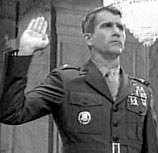 |
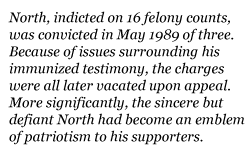 |
Arthur L. Liman, chief counsel for the Senate special committee, helped conduct the 40 days of controversial public hearings that made Marine Lt. Col. Oliver North a household name. In Lawyer: A Life of Counsel and Controversy, his posthumous memoirs published a decade after the proceedings, Liman bemoaned his part in elevating North to an icon. "I share responsibility for making Oliver North into a national hero," he wrote.
In retrospect, I think it was almost inevitable. North, boyishly handsome and photogenic, sat in his Marine uniform with his medals at a simple table, alone with his lawyer. Arrayed against him, on an elevated two-tier platform, sat 11 senators and 15 members of the House committee, plus all their aides and staff. Steven Spielberg later told me that North was televised at the hero’s angle, looking up as though from a pit at the committees, who resembled two rows of judges at the Spanish Inquisition. Spielberg called that the villains’ angle. Unfortunately, the committees had built the platforms without any advice from a movie director.
When the investigation concluded, North, indicted on 16 felony counts, was convicted in May 1989 of three: accepting an illegal gratuity, aiding and abetting in the obstruction of a congressional inquiry and destruction of documents. Because of issues surrounding his immunized testimony, the charges were all later vacated upon appeal. More significantly, the sincere but defiant North had become an emblem of patriotism to his supporters, if not a Reagan patsy and a traitor to his detractors.
In the inititial years following his trial, North used his newfound renown to raise funds for conservative causes, drumming up as much as $25 million in the immediate years following his acquittal. More recently, North has parlayed his enduring appeal into a successful career as a conservative commentator. He is both the host of a nationally-syndicated daily radio show and of the historical "War Stories" on the Fox News Channel. During the recent invasion of Iraq, he also acted as an embedded reporter for Fox News. A vocal proponent of the Iraq war, North just returned from his fourth stint there. The ex-Marine is also a figure in the conservative Christian community. Co-author of the recently published True Freedom: The Liberating Power of Prayer, North also served as the honorary chairman of the National Day of Prayer this past May.
Despite North’s successful matriculation from convicted criminal to conservative celebrity, he is still largely defined by his actions as the U.S. Counter-Terrorism Coordinator in the mid-‘80s. On June 9, 2004, when many of the world’s dignitaries, both past and present, gathered in Washington, D.C. to honor deceased U.S. President Ronald Reagan, North’s was a conspicuous absence. He explained his whereabouts to an interviewer. "Every doggone camera in the place would be shooting pictures of me instead of paying attention to what was going on."
Ten years earlier, Oliver North realized the extent to which his crimes would follow him when he ran for U.S. Senate from the state of Virginia. A documentary film crew was present to follow the 1994 race, which pitted longtime senator and Democrat Chuck Robb against North and the rest of a field that included ex-Gov. Douglas Wilder and independent Marshall Coleman. A Perfect Candidate picks up in mid-‘94 with North’s appearance at the Virginia State Republican Convention to accept the Senate nomination, despite Republican Sen. John Warner’s objections (he later endorsed Robb instead) and a letter from his former chief, Ronald Reagan, declaring North to be a liar. The silver-haired Mark Goodin, North’s Campaign Senior Strategist, is seen backstage prepping North. "There are going to be people standing on their chairs looking for commies," he says gleefully. "I’m telling you, they’re gonna be stompin’ around." He is referring to a video about to be shown to a packed civic center. Beginning with a shot of Ollie swearing in for Iran-Contra testimony, the video then displays a photo montage of the perceived enemy: Ted Kennedy, Michael Dukakis, Jane Fonda, Jesse Jackson, Dan Rather, Sam Donaldson, Bill Clinton and Chuck Robb. Then, in large letters, the words, one at a time, appear on screen: WHOSE … SIDE … ARE … YOU … ON?
In an April 25, 1994 newspaper column titled "Dangerous Currents in Virginia’s 1994 Senate Race," Dr. James Zogby identified three concerns he saw emerging in the North vs. Robb struggle. With the vote still more than six months away, Zogby was vexed by the degree of inspection the candidates’ pasts were already receiving. Former governor and then senator Chuck Robb had his clean reputation hit by scandal in 1991 when former Miss Virginia Tai Collins appeared on the cover of Playboy magazine and in an interview revealed that she and Robb were at one time sexual partners and had attended parties together where cocaine was openly used. Robb responded by denying any sexual activity, explaining that he and Collins had only shared a bottle of wine and a back massage. As to the drug stories, Robb issued an unqualified denial.
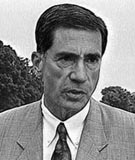 |
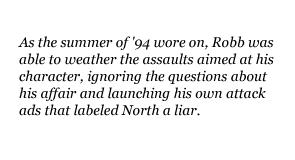 |
The North campaign, eager to take the glare off the Iran-Contra scandal, used Robb’s all too recent debacle to bruise their opponent. After listing Collins’ accusations against Robb, a North campaign TV ad blared, "Character counts and North has it all over Robb." On the defense, Robb refused to address the lurid tales. "Character is incredibly important, always has been," he told a group of reporters. "And I’ve tried to point out, I live by a code where truth is an absolute. And I have indicated on any number of occasions that if I ever fail to meet that test myself I’d leave public life."
And as A Perfect Candidate reveals, the candidates were not the only ones with previous transgressions. As the Communications Director (under Lee Atwater) of the Republican National Committee from 1988 to 1991, Mark Goodin was relieved from duty after he released a memo insinuating that newly-elected house speaker Tom Foley was a homosexual, urging Foley to "come out of the liberal closet." Atwater and George H.W. Bush disavowed it, and Goodin lost his job. In 1994, as the Chief Strategist for North’s campaign, Goodin exuded a cocky determination. A win for North would, of course, be the ultimate vindication.
In his April ‘94 column, Zogby also expressed reservations regarding the enormous amounts of money both candidates had at their disposal, estimating that Robb had acquired nearly $2 million and North as much as $15 million. With these war chests, both lead candidates were able to fund vigorous advertising campaigns that pummeled the citizens of Virginia with extreme assertions and vicious accusations. The Washington Post detailed one such ad: "Using suggestive, tabloid-style music and language, North’s new ad reminds voters of Robb’s personal problems with drug parties and marital infidelity. It flashes a Playboy cover of a woman who claimed to have had an affair with him and concludes that ‘Chuck Robb lived a lie.’"
As the summer of ’94 wore on, Robb was able to weather the assaults aimed at his character, ignoring the questions about his affair and launching his own attack ads that labeled North a liar and asked whether the GOP nominee even "knows what the truth is." Their themes were all captured with a Robb campaign appearance, shown in A Perfect Candidate. "Maybe you know something about my opponent," he assures a crowd of loyal constituents, before unloading a litany of charges. "My opponent is a document shredding, Constitution trashing, Commander in Chief bashing, Ayatollah loving, arms dealing, criminal protecting, resume enhancing, Noriega coddling, Swiss banking, law breaking, letter faking, self-serving, snake oil salesman, who can’t tell the difference between the truth and a lie."
As Robb’s bombardments took effect, both he and North struggled to break free of their past or each other, as voter apathy registered high. North in particular was forced to defend his decade-old offenses, at one point producing as a character witness former Iranian hostage his illegal transactions had helped to free. While the two nominees grappled, Goodin and the rest of North’s campaign staff contemplated switching to a more positive message. The resulting ad stressed the candidate’s family life: "Our youngest daughter Dora is 13-years-old," North says over an image of the girl laughing playfully. "And I worry about her future in a nation whose government has fallen so out of touch with its people. I’m not perfect. Trying to save American lives led me to make some mistakes," he admitted. "But if you want a senator who will stand up to Bill Clinton and the Washington crowd and put fighting for Virginia’s families first then I’m your candidate and I need your vote."
When not focusing on the airwaves, North’s campaign sought support from the "family values" constituency that is normally associated with conservative evangelicals. In his ’94 column, Zogby cited the increased power of the Christian right in American politics as his third concern. "The danger does not stem so much from the fact that the group is trying to bring religious ideas into politics, but in the fact that the ideology of the Christian right is so very intolerant and exclusive," he wrote. "The absolutist mentality of the far right wing turns political debate into a morality play where those with whom they disagree are not simply wrong but corrupt. Such subtle demagoguery is not compatible with the pluralistic character of U.S. politics and society." Ignoring Zogby, both North and Robb openly solicited their respective religious blocs, the Democrat appealing to a black church body while North, in one scene, takes to the pulpit to exhort an audience as white as the exterior of the small rural church. As the campaign unfolds, North in particular cites his Christian faith as a source of inspiration.
With the race slogging along, the two competitors shamelessly prostrated themselves before potential voters. At a campaign event held at a gun range, North is pictured as the star attraction, and his previous training serves him well as he destroys his clay targets with carefully placed shotgun blasts. A toddler, filmed holding his very own pint-sized rifle, expresses his approval. In another instance, North stands before a packed room trying to deftly disown favorable comments he made regarding the confederate flag at one campaign stop. Meanwhile, Robb is shown wandering a rural grocery store searching for someone, anyone, to glad-hand, briefly interrupting an elderly couple buying a can of beans. On another occasion, Robb positions himself outside a factory to salute exiting employees and express his solidarity to unionized workers, while carefully evading a reporter’s attempts to define his position on strike breakers. The struggle to force Robb into clarifying his stand is comical, the reporter’s frustration palpable.
As the race developed, the candidates’ attempts to elude media definition became one of the campaign's key elements. While Robb dodged questions like they were darts, North’s campaign tried to insulate their candidate from even facing the press. In one particularly amusing scene from APC, Don Baker of The Washington Post pleads for access to the Republican nominee: "Is Ollie North not coming because he doesn’t want to deal with questions from the liberal media?" the reporter asks, a smirk apparent. "We created him, come on." And as North’s Communications Director Mark Merritt replies, a sneer on his lips, "There’s a lot of people Ollie owes a debt of gratitude to. The liberal media is not one."
Throughout APC, almost all media are relegated to covering North’s campaign stops, all of them carefully planned appearances. "For those of you in the media who are going on this tour, you’re going to meet the people of Virginia," North says at one photo-op. He pauses and bunches up his face, trying to force back the tears. "Some of the best people on this planet, my friends."
Most of North’s public addresses seem orchestrated to give one main impression—that North is the heir to the Reagan legacy. And Reagan, as he still is for so many conservatives, was a hero to North and was clearly revered by those working for the nominee. In a particularly revealing moment in the film, Communications Director Merritt waxes on Reagan’s appeal and the similarities with North. "It’s that connection that he has. People look at Ollie and see what they want to see," he says before turning his gaze, the admiration for the former president oozing from his voice.
One of the amazing things about Ronald Reagan was that of all the stock pictures they had of him … they had a picture of him riding a horse. They had a picture of him in an executive presidential suit sitting on the corner of a desk. They had a picture of him in casual clothes playing with his family. They had a picture of him in a denim jacket with cotton on the collar. They had pictures of him rocking around in a cowboy hat. And he looked perfectly natural in every single outfit and yet they were all different, all of them reflecting totally different backgrounds, totally different parts of our culture. And he fit in well with every single one of them. Ollie has a lot of the same appeal.
The Reagan comparisons built off of North’s already existing image as a patriotic rebel. Oliver North’s dignified defiance of Congress during the Iran-Contra trials had made him a celebrity across America and a significant figure in certain conservative circles. In 1994, his renown was still strong. And for those who stumped for the former marine, he was an enchanting figure. "You know, he’s Elvis. HE … IS … ELVIS," Goodin emphatically declares after a successful campaign stop. Simultaneously, this is juxtaposed with the skeptical media, in this case Don Baker of The Washington Post. "I don’t think he wins people over," he says of Oliver North. "I think the people who think he’s charming are already true believers. They’re coming up, they’re already adoring of him and he senses that. I just think he’s a demagogue."
As the ‘94 campaign neared a November election, the candidates remained close, according to various polls, with Robb taking a slight lead. Goodin, worn down by the endless jostling, paused for a moment of reflection in the backseat of a car as the camera rolled. "We’re all caught up in the show. We’re all caught up in the entertainment value of politics," he says while rubbing his eyes in exhaustion with balled-up index fingers.
We have to serve up something for the press or they eat us. It’s like feeding lions. If they’re fed they don’t turn on us. But the day they’re not fed, they’re hungry and they turn on us. So we have to serve up the daily entertainment, the daily side show. Getting people elected—whether we like it or not—it’s not pretty, but getting people elected unfortunately has a lot to do with dividing. Setting up a base of support and fracturing off those that … you know, it’s like busting a big rock. You try to chip off your piece and break the rest of it into so many smithereens that they don’t matter. But that is different than what it takes to govern because what it takes to govern is all about finding consensus on difficult issues and bringing people together. People who don’t always agree, but there’s some sense of common purpose. And we are obsessed with getting people elected and we are obsessed with the show and so are you (he says looking at the cameraman), or you wouldn’t be here. So we provide daily entertainment. What we are not providing is serious solutions to what is going on in the country. Not us, not Chuck, not Clinton, not Bush, not anybody.
Gooden’s comments about the state of the American electoral process are enlightening. Coming when they do in the latter stages of A Perfect Candidate, the words punctuate a desperate contest of deflection and distortion waged by the North and Robb campaigns. Viewed in 2004, they seem eerily relevant. Directed by R.J. Cutler (who is also behind the current political reality series American Candidate airing on Showtime) and David Van Taylor, the 1996 film is expertly edited to include numerous moments that cut through the rhetoric and elaborate political dance to reveal what’s really at stake: finding the best representative to look after the people’s interest. As depicted in APC, political figures are preoccupied with winning their seats. And after doing so, maintaining a hold on them often seems to dwarf any other concerns, except for what is the perceived will of specific groups and how to placate them most effectively.
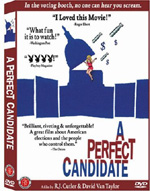 |
.gif) |
The celebrated documentary The War Room (which Cutler helped produce) followed George Stephanopoulos and James Carville as they tried to elect a president. Clinton and Bush were nowhere to be found in the film, and in restricting the focus, the film revealed how a modern-day campaign works. A Perfect Candidate, on the other hand, features the two candidates. And by including not only the campaign staff but also the media and other sideshow elements, it is able to show how a contemporary election works.
In the fall of 1994, as election day loomed, North and Robb could only claim equal pieces of the pie, as most voters seemed to have only tepid reactions to both. In the end, the incumbent Democrat narrowly edged out his main competition. Robb’s 46 percent stake was only three points more than North’s. Significantly, independent Marshall Coleman snagged a sizeable 11 percent. The disenfranchised had spoken. Richmond TV News reported that the top issue cited as important by Virginia voters was "honesty/ethics" and that, based on this criteria, Robb got over two-thirds more votes.
Watching this on his hotel television, Goodin winces, his face ashen. Downstairs on the Republican Convention floor where North will soon deliver a moving address conceding defeat, Goodin reveals no emotion. But on the drive home, the wounded campaign director unleashes a tirade. "Next time around I cut the guy’s balls off," Goodin fumes. "We shouldn’t have let off the gas. I’ll never make that mistake again. We should’ve just kept pounding and pounding."
As he walks up the drive to his house, shoulders leaning forward with the resolve of a World War II general, he repeats a prophetic mantra. "I’ll never make that mistake again. We should‘ve just kept pounding away."
DISCLAIMER: THE VIEWS AND OPINIONS EXPRESSED IN OLDSPEAK ARE NOT NECESSARILY THOSE OF THE RUTHERFORD INSTITUTE.


